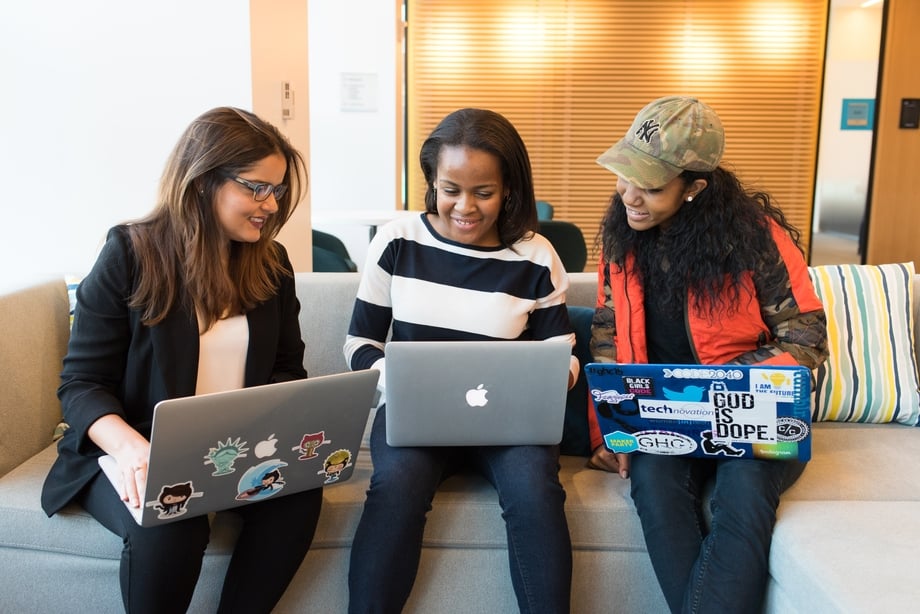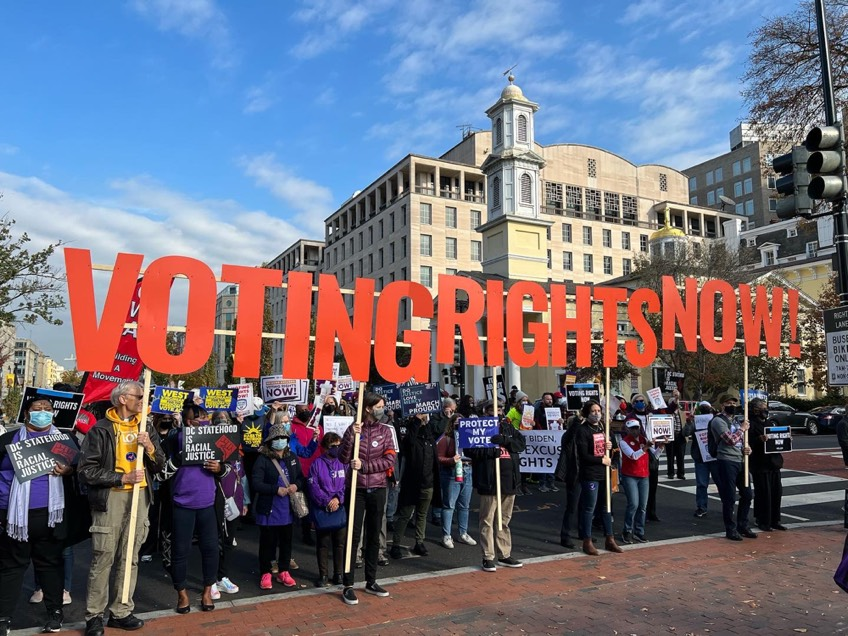How DEI Impacts Us — And Democracy
With attacks from the recent administration, DEI has been a hot topic. In a recent blog, I broke down what DEI is — and isn’t. In this piece, I’ll describe just a few ways DEI impacts us and our democracy. I’ll then share ways you can support it.
How Does DEI Impact You?
DEI benefits many marginalized groups, from women to veterans to religious minorities. Here are a just a few examples.
DEI’s Impact on Women
Across both colleges and the professional spheres, women have majorly benefitted from DEI.
Stay Updated
Keep up with the League. Receive emails to your inbox!
The following are just a few ways DEI has improved women’s opportunities and quality of life:
- Opening admission and increasing opportunities at universities and corporations nationwide;
- Creating mentorship opportunities, leadership trainings, scholarships, investment programs, and more that grow women’s success;
- Getting us closer to equal pay and workplace representation;
- Encouraging everyone from medical researchers to film producers to pay attention to women’s needs and perspectives;
- Creating safer workplaces through anti-harassment programs and anti-discrimination policies;
- Promoting pregnancy and parental leave and benefits;
- In some cases, imposing quotas so schools and workplaces entrenched in patriarchy were forced to open their doors to qualified women.
In 1997, it was estimated that at least 6 million women held positions they wouldn’t otherwise hold because of affirmative action. Notably, while opponents to DEI claim that Black women and other women of color benefit the most from DEI, most of the women who obtained these positions were white.

Studies suggest that white women have disproportionately benefited from corporate DEI efforts. While all women, including white women, are still underrepresented in the workplace, white women are often the first to benefit from DEI and affirmative action programs. For example, white women hold 19% of all C-Suite positions, whereas women of color hold just 4%. Of course, both are well below women’s status as 50% of the population.
Because of white women’s disproportionate gains, McKinsey estimates that it would take 22 years for white women to achieve gender parity but 48 for women of color. Yet without DEI, it’s unlikely parity would be gained for any group.
Veterans
While people don’t often associate DEI with veterans, former servicemembers are a major population that can benefit from these programs.
Because of DEI, many organizations have “veteran preference” hiring or recruiting programs. The University of South Carolina, for example, “requires at least one qualified veteran to be interviewed for each full-time equivalent position.” Certain organizations also have “preference” policies for the surviving spouses or children of servicepeople who died in combat.
These programs are essential for several reasons. For one, there are many biases and misconceptions about veterans that can impact their ability to enter certain spaces. Unfounded concerns about a veteran’s education, political beliefs, or emotional control may follow them into the workplace or even impact whether they’re considered for roles. DEI works to have people assumptions like these to create a more knowledgeable, inclusive environment.

For veterans who were wounded, physically or psychologically, during service, DEI is a crucial tool for workplace understanding and integration. Service-related disabilities or conditions should not prevent someone from being hired or accessing a workspace. DEI encourages accessibility and a greater understanding of how employers can work with employees who may be dealing with common conditions like Post-Traumatic Stress Disorder, Traumatic Brain Injuries, heart conditions, or movement restrictions.
People with Disabilities
The above can be said for anyone dealing with any disability – that’s an estimated 1 in 4 US adults.
It was just over 30 years ago that the US passed the Americans with Disabilities Act (ADA), mandating that work and public places make reasonable accommodations for people with disabilities. The ADA National Network defines a person with a disability as "a person who has a physical or mental impairment that substantially limits one or more major life activity." These may include physical impairments like compromised immune systems, psychological impairments like anxiety, or cognitive impairments like autism.
Given how recent the ADA is, it's unsurprising that we still have a long way to go in achieving equity.
Yet DEI has brought us closer. There are so many measures we see today that we never saw in the past – an acceptance of remote work, the presence of sign-language interpreters at concerts, closed captioning in movie theaters. These allow more of us to participate in daily life together. And because of that, we all benefit.
Businesses
While we often talk about DEI in terms of race, it's much bigger than that. DEI supports better bottom lines in business and elevates brands in ways that are win-win for employers and employees equally.
These include:
- A greater likelihood of financial success: 75 percent of companies with “decision-making teams reflecting a diverse and inclusive culture” exceed their financial goals. What’s more, “gender-diverse and inclusive teams outperformed gender-homogeneous, less inclusive teams by 50%, on average.”
- Higher employee retention and lower turnover: millennials report they’ll stay longer at companies that value a diversified workforce. In contrast, over 33% of workers say they’d change jobs to be on a more inclusive team.
- Reaching a larger, more diverse talent pool: Diverse and inclusive hiring practices open you up to considering greater pools of talent, who can bring perspectives and experiences that expand your current capacities.
- A competitive business advantage: More and more consumers are intentionally seeking out business that reflect their values — and disconnecting from the ones that don’t. Maybe that’s why “organizations with diverse teams are 33% more likely to outperform their rivals in profitability.”

For example, let’s take a look at the national retailer Target. At the end of January, Target publicly announced the ending ofits DEI initiatives, including employee programs and vendor investments. The public withdrawal quickly resulted in a boycott of the brand, plummeting stock prices, and a shareholder lawsuit for lost revenue.
Black and Brown Americans
And yes, DEI impacts people of color. It’s an investment in the equity we preach. It acknowledges that in this country, Black people were enslaved for more years than they have been free, that we only achieved the right to vote in the last century, and that we still face unequal opportunities in housing, education, employment, health care, and so much more.
Providing opportunities to Black and brown Americans does not equal taking away opportunities from white Americans. Imagine you’re running a race, but due to circumstances you can’t control, one runner gets to start 30 feet closer to the finish line. That’s how white people experience America — by design as a result of hundreds of years of systemic social and economic advantages. Getting back to this imaginary race example, DEI doesn’t switch the runners’ places — it gives the runner who’s farther back the boost they need to start closer to their fellow racer. It’s an equalizer, not an advantage.
DEI and Democracy
The League’s vision is a democracy where every person has the desire, right, knowledge, and confidence to participate. For this vision to become a reality, we need DEI.
In other words, it’s a system where the diversity of the people and their opinions are reflected in the people we elect and the laws we pass. It’s one where people who run for office or cast their voices experience inclusivity and fairness. Unfortunately, not all politicians believe in this system.
Voter suppression policies like overly strict ID requirements and cumbersome registration processes make it harder for certain people to cast their votes than others, discouraging participation. Gerrymandering, the process of drawing congressional and state districts to advantage a party or race, decreases the power of certain communities based on their identities. Laws that target the basic rights of certain people, like laws excluding trans athletes from sports or laws eliminating the right to reproductive care, limit those people’s ability to participate in every part of life.

DEI opposes these anti-voter measures. It demands that we consider the intricacies of everyone’s identities and reconsider our biases. It insists that everyone deserves to exist as their authentic selves in school, the workplace, and beyond and that we all deserve equal opportunities. That is the heart of DEI, and it’s also the heart of democracy.
Following the recent executive order to eliminate DEI staff, a handful of lawsuits were filed. One lawsuit was filed by the City of Baltimore and three organizations citing violations of the separation of powers doctrine, due process, and freedom of speech. These lawsuits illustrate the value of a true democracy where every person can make their voice heard so that our government reflects those it serves. It’s powered by the people rather than a few individuals or small special interest groups.
What Can We Do To Protect DEI?
Last week, I addressed the actions we have seen thus far from the Trump Administration, including his attacks on DEI. Specifically, I referenced his “weakening of the Department of Justice’s civil rights work, continued attacks on people of color and the LGBTQIA+ community.” These attacks on DEI are attacks on democracy itself.
Both I, as an individual, and the League as a century-strong institution, demand that Congress act now to respond to this ongoing assault on our liberties.
But if you’re not a member of Congress, here are a few more things you can do:
- Find your representatives and call or email them to insist they remain committed to DEI, and thereby, the American people;
- Support organizations who are committed to DEI work, like the League of Women Voters, or check organizations you support to ensure they encourage DEI in practice;
- Join your local League to get involved in advocacy within your community;
- Educate your friends and family about what you learned here and share this post with others;
. - Incorporate DEI into your personal and/or professional goals. Why not identify a way of being more inclusive and making that a belated New Year’s resolution? Ask yourself, “Who is impacted by what I am doing, and how can I get that person or group involved?” Then invite that person to collaborate and be a decision-maker on that project or assignment;
. - Learn more by reading books that expand your horizons; and
- Share positive news and information about DEI with your networks! It’s a great way to counter negative myths without giving inaccurate or anti-DEI posts more engagement.
These attacks on DEI are scary, but as long as our nation is made up of unique people of different races, genders, abilities, and experiences, no one will be able to eradicate this movement. We’ve fought for DEI before and organizations like the League are ready to do it again. We hope you’ll join us.
The Latest from the League
If you’ve been keeping up with the news, you’re probably aware of the recent attacks on “Diversity, Equity, and Inclusion” (DEI) policies. But what is DEI, how does it really impact us and our democracy? This blog will provide more clarity into the concept, who’s opposing it, and why it’s important.
League of Women Voters of the US CEO Celina Stewart issued the following statement in response to actions taken by the new administration this week and the impact they will have on our democracy.
On the 105th anniversary of its founding, the League of Women Voters sent a letter to Congressional leadership regarding the organization's grave concern over the state of our nation.
Sign Up For Email
Keep up with the League. Receive emails to your inbox!
Donate to support our work
to empower voters and defend democracy.





